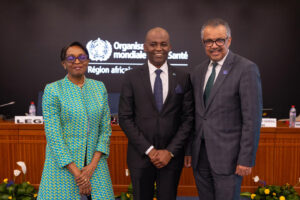by Ben Taylor
Vigilance around Mpox
On August 17th, 2024, the Ministry of Health provided an update on the threat of Mpox outbreak. This followed a recent global upsurge of cases, including in Kenya, Uganda, Rwanda and Burundi, as well as in the Democratic Republic of the Congo (DRC) where the disease has long been established. One confirmed case was identified very close to the Tanzanian border, in Taveta, Kenya.
Due to this threat the public was advised to take recommended precautions to protect themselves and prevent the disease from entering the country.
The Minister of Health, Jenista Mhagama, offered reassurance that “until now, no patient has been proven to have Mpox infection in the country,” and that “the Ministry of Health continues to take measures to prevent Mpox from entering the country.”
This includes strengthening port health services through screening of all travellers entering the country through ports, land borders and airports, to identify travellers with signs and symptoms of Mpox and take appropriate action.
The Ministry said it would also strengthen surveillance in the community for early and timely identification of any person with signs or symptoms of Mpox, in order to manage suspect and prevent the spread of infection in community.
Further, the Ministy said it will enhance the preparedness and readiness in health care facilities and provide health education through multi channels communication approach.
The Minister also issued guidance on steps people should take to prevent infection. These included seeking medical attention in case of rashes and swelling, avoiding skin-to-skin contact with patients, cleaning hands regularly and avoiding earing carcasses of animals that may be infected.
Understanding the virus
The World Health Organisation (WHO) on August 14th declared that the upsurge of Mpox in the DRC and a growing number of countries in Africa constitutes a public health emergency of international concern (PHEIC). As of August 17th, there had been 545 alerts of Mpox cases in Burundi, one confirmed case in Kenya, four in Rwanda and two in Uganda.
Confusion around how Mpox spreads and what risks it presents has been exacerbated by the range of viral variants in circulation. In East Africa, a strain known as clade 1b appears to be responsible for the majority of new infections, and has been detected elsewhere in the world in recent travellers.
In western DRC, a separate strain, known as clade 1a, has been in circulation at a relatively low level for over 50 years.
A third variant, known as clade II that had previously been circulating only in west Africa – Nigeria and elsewhere – was responsible since 2022 for a global epidemic. This spread largely among gay men and has thus far caused over 100,000 infections, including in the UK. With vaccination campaigns, this outbreak has been largely brought under control.
While clade II is thought to largely to be sexually transmitted, clade Ib is thought to be transmitted both via sexual contact and likely in other ways. Clade 1a is thought to be transmitted between humans only rarely, with most cases resulting instead from animal-human contact, such as consumption of bush meat.
A key factor in the rise of Mpox cases is thought to be the decline in population immunity after smallpox was eradicated in 1980 and smallpox vaccination—which also protects against monkeypox—was ended. (World Health Organisation, The Citizen, Science.org)
Dr Faustine Ndugulile elected to WHO role
Tanzania politician and medical doctor, Dr Faustine Ndugulile, has been elected as the new World Health Organisation (WHO) Regional Director for Africa.
Elected to the position on August 28 during the 74th session of the WHO Regional Committee for Africa in Brazzaville, Congo, Dr Ndugulile, the former Deputy Minister for Health and Kigamboni Member of Parliament, will succeed Dr Matshidiso Moeti.
While acknowledging the progress Africa has made in the health sector, Dr Ndugulile emphasised in a statement to Parliament that substantial challenges remain before the Sustainable Development Goals (SDGs) deadline.
His campaign focused on four key areas: ensuring access to health services for all Africans, preparing the continent for pandemics such as Covid-19 and Mpox, fostering unique cooperation among African institutions—including parliaments—and strengthening the WHO’s presence in Africa to maximise resource benefits.
“I am currently preparing for my new role. I have been given six months to organise myself, understand the organisation’s operations and develop my vision. This preparation will ensure that I can start effectively when I begin my tenure in March,” Dr Ndugulile said.

